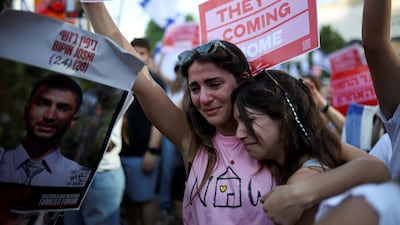The sight of captive Palestinians and Israelis being reunited with their families and communities on Monday will have moved many people. Twenty of the Israeli hostages taken by Hamas into Gaza two years ago – the last of the total number who had not yet been freed and remained alive – and nearly 1,800 Palestinian prisoners and detainees who had been held in Israeli jails have been released to their communities. It is an exchange that should have taken place much sooner.
The image of gaunt Israeli hostages as well as disturbing video reports this week showing Palestinian detainees being humiliated before their release by Israeli soldiers starkly illustrate this conflict’s dehumanising effects. Hamas’s unjustifiable kidnapping of 251 people on October 7, 2023, and the reality that, for decades, arrest and detention by Israeli forces has been a fact of life for most Palestinian families underline the need for this conflict, and the occupation of Palestine, to come to an end.
The political will, the negotiations, the international diplomacy and the sheer logistical effort needed to get to this point have been considerable. Aside from the humanitarian and moral imperative of securing the release of captives on both sides, Monday’s exchange can help build immediate momentum – a vital component for making all phases of the US-backed Gaza peace plan work. Importantly, aid entering Gaza is crucial. However, everyone who wants to see a lasting peace in this part of the Middle East must work to keep up this impetus.
Rarely has the underlying issue of Palestinian freedom and sovereignty been higher on the international agenda. Last month’s UN General Assembly saw more countries – including some long-term Israeli allies – recognise Palestinian statehood, thereby lending their support to the conflict’s only realistic endpoint: an independent Palestine existing alongside an Israel that is within internationally recognised borders and at peace with its Arab neighbours.
There have been many false dawns on this journey; the last ceasefire in Gaza fell apart in March amid mutual recriminations by Israel and Hamas. Israel’s reckless strike against Hamas negotiators in Qatar last month was a spectacular sign of reckless and bad faith action. Nevertheless, there remains significant momentum for peace among many countries, including those who took part in Monday’s Gaza summit in Egypt. Just as importantly, many members of the general public in countries across the Middle East, Europe and the US have been profoundly moved by the war in Gaza, making Palestine a live issue for their national leaderships. Such energy will be needed as the rest of the 20-point Gaza plan unfolds.
What the emotional scenes from the prisoner exchange tell us is that both Palestine and Israel are highly traumatised societies that need to heal. For such healing to begin – and it will be a very long road – peace and political progress are essential. Mr Trump acknowledged this during his speech to Israel’s parliament on Monday, when he said a new coalition of “proud and responsible” nations had come together to achieve peace and the “historic dawn of a new Middle East”.
This is indeed a time for political leaders, and their publics, to keep their eye on the prize – that is, the final resolution of this decades-long conflict, an end to occupation and a new beginning for Palestinians and Israelis.


